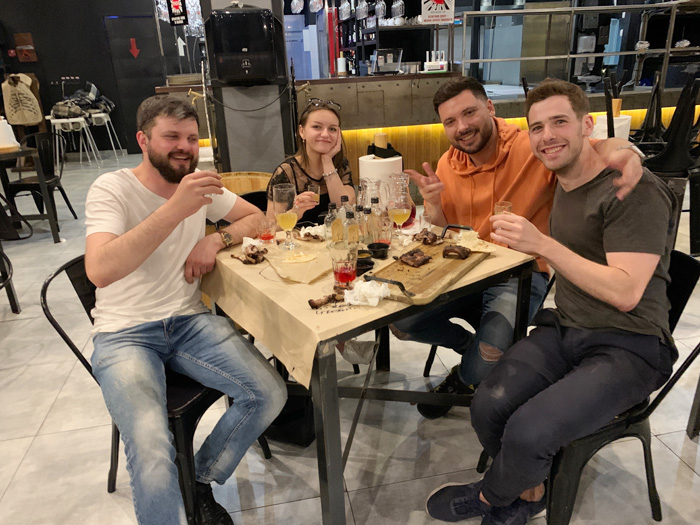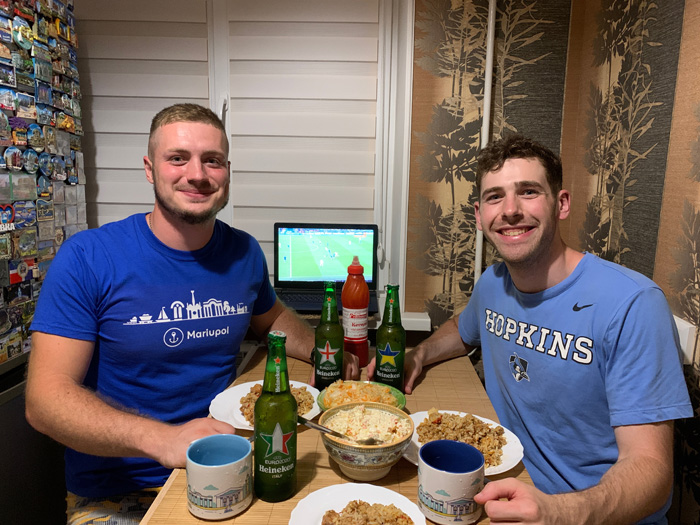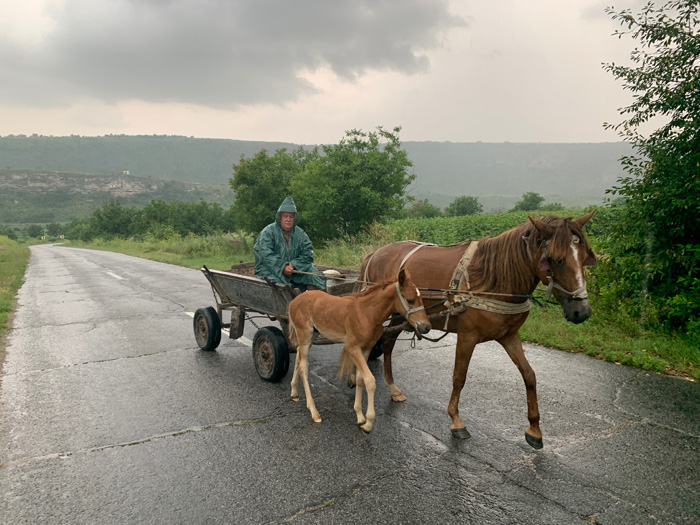Editor’s note: Max Frost, 27-year-old son of Chronicle owners Mark Frost and Sandra Hutchinson, was our foreign correspondent in 2016-17 when he was living in India and then traveling, mostly in Asia.
His weekly reports in The Chronicle were hugely popular and drew packed crowds when he twice spoke at Crandall Public Library.
Last year Max and his friends Max and Billy launched their own news company.
On Aug. 27, RocaNews(.com) celebrated its first anniversary — and reached 1-million followers on Instagram.
We persuaded (ordered) Max to share some of his Ukraine reporting with his parents’ Chronicle.
By Max Frost, Chief Operating Officer, RocaNews.com
In July, after 16 months largely in lockdown, I took a 17-day trip to Ukraine to report for RocaNews, the news company I co-founded last August (2020). The trip was fascinating — I visited the war zone in the country’s east, spent a day at Chernobyl, hitchhiked through the mountains, and met dozens of interesting people.

Most of the people I met loved America. It was almost like they had a script: Dozens of times, I heard people say, “Amerika — moya mechta!” America is my dream! When I said I was from the US, the most common response was “Wowwww.”
There were two highlights to the trip.
The first was a night I had out in a small Ukrainian city with my barber, Oleg, and his friends. After cutting my hair, he invited me to join him and his friends to watch that night’s Euro Cup quarter-final soccer game.
Ukraine was the Cinderella story and set to go up against England. They lost 0-4, but we had enough plates of grilled ribs, homebrewed vodka shots and whiskeys to hardly notice. (Read all about that night later in this article.)
The other highlight was more serious.
Since 2014, Ukraine has been fighting a war against Russia-backed separatists that has left 15,000 people dead and displaced nearly two million.
The conflict is at a stalemate, although daily gunbattles still occur along the ceasefire line distinguishing separatist- from government-controlled territories.
I traveled along the ceasefire line, getting within 10 miles of it. Bunkers dotted the landscape; soldiers stopped our bus at various checkpoints and randomly selected men for interrogation. No one bothered me, but the woman next to me told me not to get off even if I was.
I ended up in a port city called Mariupol, where I stayed with a Ukrainian soldier named Andrei. Andrei was a college student in 2014, when Russian separatists staged a coup at the city hall, executed police officers, and took over the city.
They ran the city for months, until Ukrainian militias won a battle to take it back. Throughout, Andrei would sit in his apartment and hear the gunfire on the streets down below.
Max in faded Chernivtsi: Barber with a bar
I did not plan to stop in Chernivtsi, a small city in western Ukraine, but something about it drew me in as my bus passed through. It may have been because it was my first taste of civilization after days in the countryside; or because my ancestors came to America from a place nearby. Either way, I got off the bus. It proved the best decision of my trip.

Initially, Chernivtsi struck me as vacant, like a shell of itself, or a ghost city.
One-hundred years ago, it was a crossroads between central and eastern Europe, full of Germans, Jews, Ukrainians, Poles, and Romanians. Taxi drivers juggled languages and currencies; the markets were bustling.
Then World War II saw the killings or deportations of most of those people. Today, Chernivtsi is almost entirely Ukrainian.
The city’s atmosphere — quiet and empty — is at odds with its gorgeous architecture, which tells of a much more prosperous place. If Chernivtsi were in another country, it could be a bustling tourist city. Instead, it’s languishing in one of Europe’s poorest regions. That made it all the more interesting to visit.
I wandered around the city looking for a museum I couldn’t find and that nobody knew existed. I visited the Palace of Culture, a cavernous Soviet building that was open to the public but whose hallways were deserted with all the lights off. I met a few Indian people on the street, medical students at Chernivtsi’s university. They told me I was the first proper-English speaker they had encountered in the city.
Eventually, I went for a haircut at a U.S.-themed barbershop, with a twirling barber pole and Jack Daniels spray bottles.
There was a bar inside where the host had me take a seat. A couple next to me played Grand Theft Auto on a nearby TV.
The host offered me a viiskii, which I understood (whiskey), and peeepsee, which I did not. “Peeeepseee, Peeeepseee.”
Eventually he went to the fridge and poured me a whiskey and Pepsi.
That night, Ukraine was playing England in the Euro Cup soccer tournament; Ukraine was the Cinderella story, and everyone in the country was talking about it. In Russian, I asked the guy next to me where I should watch the game.
That guy was named Oleg (in orange in the front-page photo) and he spoke perfect English. He told me I’d need a reservation and it may be too late. He offered me a cigarette, which I accepted. I don’t smoke, but I wanted to make friends. The cigarette turned into several as we sat on the shop’s stoop.
Oleg was a national breakdancing champion and beatboxer; he had competed all over Ukraine and Europe. Several years ago, he went to compete in Israel.
A friend there told him he should stay — the salaries were better — so he did, spending two years working in a factory that produced egg cartons. That’s where he learned English.
He came back to Chernivtsi, where he was from, and trained as a barber. He got a job at the shop I was at, which he said is the best in Chernivtsi.

Oleg poured us each a whiskey, then offered to cut my hair. A drinking barber didn’t seem like the best idea, but I went for it. The haircut was a bit odd, but by the end, he invited me to join him, another barber named Sasha and Saha’s girlfriend, Anya, to watch the Ukraine game. I gladly accepted.
We pre-gamed with pizza, whiskey and cigarettes at the barbershop, then went to a restaurant to watch the game over grilled ribs. The night probably took a year off my life.
Ukrainians drink vodka, and as I learned, their drinking protocol says that only the person who opens the bottle can pour the shots, and they dictate the pace of drinking.
That person was Sasha, who could drink more than any person I’ve ever met. He poured round after round, preceding every one with a toast: “To Ukraine!” “To friendship!” “To meeting!” “To health!”
We chased the shots with cherry juice.
Oleg spoke Ukrainian and English; Sasha and Anya spoke Ukrainian and Russian; I spoke Russian and English.
With each round, the language barrier dissolved further. I’d never taken so many shots in a night.
“Don’t feel like you have to take that,” Oleg kept saying.
“B.S.! If he’s a man, he drinks with us! Like a Ukrainian!” Sasha would say.
Before I went home, Sasha took me to his car, a 1990 Chevy sedan. He was proud of the American vehicle, and with good reason: It looked practically new. In America, it would have died years ago.
He tried to give me a ride, but I refused.
I finally got to bed at 2 AM.
The scores were Ukraine 0, England 4, and Chernivtsi 1, Frost 0.
Oleg and I are still in frequent contact. I’d go back to Ukraine just to visit him.
Copyright © 2021 Lone Oak Publishing Co., Inc. All Rights Reserved
 Glens Falls Chronicle Serving the Glens Falls/Lake George region; Warren, Washington and northern Saratoga counties since 1980
Glens Falls Chronicle Serving the Glens Falls/Lake George region; Warren, Washington and northern Saratoga counties since 1980

